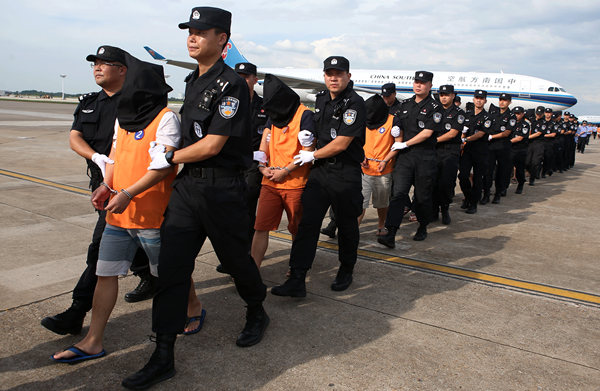Dear all,
I would like to take this opportunity to warmly thank the Estonian Presidency, and my friend Andres Anvelt, for their excellent work in organising this first informal Justice and Home Affairs Council meeting here in Tallinn.
It is clear that we have a lot of homework ahead of us in the coming six months, and I am glad that we share the same priorities when it comes to migration, borders and security.
We have made considerable progress as a Union in managing the migration crisis. In the Eastern Mediterranean, arrivals have decreased with 97 percent.
In contrast, numbers are rising on the Central Mediterranean route. But in the last six months, we have improved our cooperation with Libya.
We have increased our support to the Libyan coast guard to help them better patrol their sea borders and conduct search and rescue operations.
We are supporting voluntary returns from Libya to countries of origin in cooperation with IOM. More migrants have already returned in the first half of 2017 than in the whole of 2016.
In the Sahel region, we are supporting countries like Niger to better manage their borders.
Relocations from Italy have increased from 2,000 to 8,000 since the beginning of the year.
Taking into account the urgency of the situation, we need to further step up our work. That is why, on Tuesday, the Commission adopted an Action Plan setting out a series of immediate actions to support Italy, to stem the flow and show solidarity. These actions should be taken by all EU Member States, including Italy itself, the Commission and EU Agencies.
This Action Plan implements the fundamental principles of our migration policy: Showing solidarity with those fleeing war and persecution whilst at the same time stepping up our work to return those who are not and have no right to stay in Europe.
We all now need to intensify and accelerate our efforts to turn the commitments made by EU leaders recently into reality.
We had an open and frank discussion today on everyone’s responsibilities, and I am glad to see that Ministers are committed to swiftly start this work, notably:
- to contribute much more substantially to the EU-Africa Trust Fund;
- to accelerate relocations for all those eligible;
- to better coordinate the maritime operations to save lives at sea and fight smugglers and also to jointly step up engagements with Tunisia, Egypt, Algeria as well as Libya to improve search and rescue operations,
- and to improve returns internally and externally: First, we agreed to mobilise our own internal capabilities, alongside those of the European Border and Coast Guard, to support the return of irregular migrants from Italy. Secondly, we committed to step-up negotiations on readmission agreements with main countries of origin and using all leverages at our disposal including our visa policy.
The situation in Italy is yet another stark reminder of the need to pursue our work on a genuine and fair reform of Dublin and our entire asylum system. We need a crisis resistant system. Our Maltese friends have done important preparatory work. Discussions now have to advance.
Now turning to the discussions we have had today on security. Recent incidents have demonstrated the importance of linking existing and future EU information systems for security and border management. Information must be available when it is needed and where it’s needed in real time.
This is why I welcome the importance that the Estonian Presidency will give to improve information exchange at EU level over the next six months.
Last week, we proposed to strengthen our EU Agency in charge of our information systems, eu-LISA, which is based here in Tallinn. With this proposal, eu-LISA will become a digital centre of excellence, and the nerve centre of our actions to achieve the interoperability of our information systems.
I know they will make good progress on this legislative file. We want to make sure that eu-LISA can deliver the technical solutions to make interoperability a reality by 2020.
I also welcome the commitment of the Member States to finalise the negotiations on EURODAC, the Schengen Information System and ETIAS by the end of the year.
All our work on information systems is key to strengthening our external borders.
I look forward to continue working closely together with Andres and the Estonian Presidency to move forward on all these issues in the next 6 months.
Thank you.
